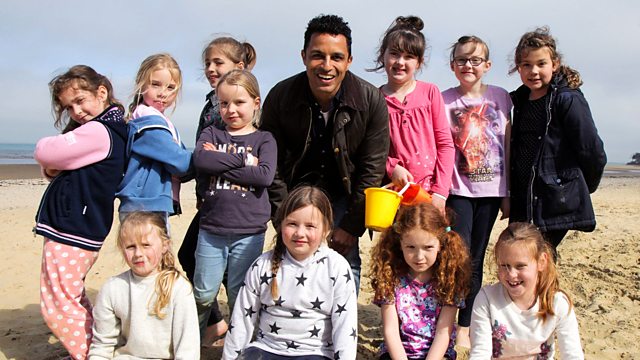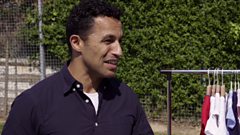
Episode 2
Will Dr Javid Abdelmoneim's gender-neutral mission produce a meaningful change by the end of term?
Dr Javid Abdelmoneim poses some of the most profound questions facing the UK today. Is the way we treat boys and girls in childhood the real reason we still haven't achieved true equality between men and women in adult life? And could stripping away the pink and blue - and the other more subtle ways that boys and girls are shaped to be different - be the way to raise kids with abilities and attitudes that are the same regardless of their gender? Dr Javid takes over Year 3 in Lanesend primary school in the Isle of Wight, aiming to remove all differences in the way boys and girls are treated and to see if, after a term of 'gender neutral' treatment, he can even out the gaps in their achievement, from self-confidence to emotional intelligence.
Aged just seven, these kids have already absorbed the idea that boys are more important than girls, that strong is a word than only applies to boys and that the only thing that girls are better at than boys at is being pretty. As a doctor, Javid knows that there are basic biological differences between the sexes, but he believes our biology can't fully explain why men and women's life chances in the UK are still so unequal. He believes that how we treat our children in childhood has to be the deciding factor - and the latest research in how brains develop backs him up.
A visit to Prof Gina Rippon at Aston University, one of the UK's leading experts in brain imaging and neuroscience, reveals that there is no such thing as a male or female brain type. Instead the brain is a plastic organ, shaped and moulded by experiences in which childhood is key. Giving boys and girls different toys to play with and different experiences as they grow up means that the genders develop different skills and different behaviours. So in theory, giving kids a childhood in which their gender doesn't define how they are treated should enable to them to develop more equal abilities and attitudes - and ultimately allow them to forge their own paths in life regardless of their gender. But to be sure that his changes really do make a difference, he commissions Dr Stella Mavroveli from the psychometric lab at University College London to record what level of difference there currently is between the boys and girls across the spectrum of school subjects, but also in a range of behaviours and psychological traits from confidence and self-esteem to empathy and social skills. Dr Javid is shocked by the test results, girls show a consistent pattern of underestimating their academic abilities and lack confidence and self-esteem in comparison with the boys, while the boys demonstrate an inability to express their emotions in comparison with the girls. The test results are enough to convince teacher Graham Andre to adopt a broad range of changes and to eradicate from the classroom anything that reinforces the idea that boys and girls are fundamentally different. From the books they read to the way they are spoken to, the mission is to emphasise to the kids that gender makes no impact on what they are capable of achieving.
Javid designs a series of focused interventions to target some of the children's most deeply held views - from transforming their view of which jobs men and women are able to do to shocking them with the fact that contrary to what they have always believed, girls at their age are just as strong as boys. Javid believes his gender-neutral approach can work, but if he is to achieve real change he realises he is going to have to take his mission into the kids' home lives.
Out of school, Javid is astonished at how much childhood has changed since he was growing up. Boys playing with construction toys develop spatial awareness skills that girls don't while surrounded by princess play outfits and dolls. He challenges the parents of Mr Andre's class to clear out all of the gendered toys and clothes - and to change the way they divide housework and childcare. Will the parents get on board? And will Dr Javid's gender-neutral mission have produced meaningful change when he repeats his tests at the end of term?
Last on
More episodes
Previous
Next
You are at the last episode
See all episodes from No More Boys and Girls: Can Our Kids Go Gender Free?
Clip
-
![]()
'Made to be underpaid'
Duration: 01:10
Music Played
-
![]()
Bastille
Campus
-
![]()
Take That
And The Band Plays
-
![]()
Little Mix
Black Magic
-
![]()
Ella Henderson
Ghost
-
![]()
Bastille
Fake It
-
![]()
The Shins
Painting A Hole
-
![]()
Lykke Li
I Know Places
-
![]()
补濒迟鈥怞
Dissolve Me
-
![]()
补濒迟鈥怞
Something Good
-
![]()
Bastille
Power
-
![]()
Of Monsters and Men
Empire
Credits
| Role | Contributor |
|---|---|
| Presenter | Javid Abdelmoneim |
| Special thanks | Lanesend Primary School |
| Consultant | Jayne Osgood |
| Sound Recordist | Ryan Patton |
| Sound Recordist | Mike McGinn |
| Sound Recordist | Martin Adams |
| Sound Recordist | Ben Ring |
| Sound Recordist | Christian Bourne |
| Production Coordinator | Mayank Gupta |
| Production Coordinator | Ashley Freitas |
| Assistant Producer | Jessica Howe |
| Assistant Producer | Myles Harrison |
| Assistant Producer | Paul Rigby |
| Producer | Ekta Walia |
| Editor | Dan MacDonald |
| Editor | Julian Caidan |
| Production Manager | Robert Ford |
| Production Manager | Susan Lee |
| Executive Producer | Helen Veale |
| Director | Samuel Palmer |
| Series Producer | Jeremy Daldry |
| Editor | Ruth Hornby |
| Editor | Nicola Bitton |
| Editor | Paul Hodgson |
| Production Company | Outline Productions Ltd |


